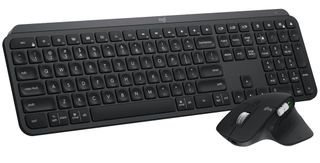Logitech reveals the most advanced mouse in the world
Logitech MX Master 3 brings speed, and MX Keys extra customisation

Home working may be about to get a whole lot more powerful with the latest premium mouse and keyboard releases from Logitech.
The company says its new MX Master 3 mouse offers unparalleled speed and precision in scrolling for a wide range of users, from software programmers to graphic designers.
In addition, the new MX Keys keyboard looks to be an ideal partner to the mouse, offering a top of the line typing experience that also offers intelligent lighting and ergonomic support.
- The best mouse of 2019: 10 top computer mice compared
- Best PC Gaming headsets of 2019
- Best keyboards of 2018: top 10 keyboards compared
MX Master 3
The MX Master 3 is Logitech's most powerful mouse to date, featuring a completely re-designed wheel that can scroll a thousand lines in one second - a potential lifesaver for programmers hunting for a particular line of code.
The new wheel, made of Swiss stainless steel, features 90 percent faster scrolling speeds than previous generations, with magnets inside the body cutting down on both friction and noise.
Users can still opt for a haptic feel when scrolling, with the option of a silent ratchet mode alongside traditional experiences. Thanks to a 4,000 DPI sensor, the MX Master 3 is also incredibly precise when tracking on any surface, even glass.
On the device itself, Logitech has made the thumb wheel of the MX Master 3 larger than ever, as well as making it out of stainless steel - although total weight is still an incredibly mobile 141g.
Are you a pro? Subscribe to our newsletter
Sign up to the TechRadar Pro newsletter to get all the top news, opinion, features and guidance your business needs to succeed!
This gives easier access to the forward and backwards quick buttons, with a new hidden thumb button used to mimic gesture controls for navigation, such as zooming and switching across screens and apps. Logitech has also optimised the device for a number of common apps such as Photoshop and Microsoft Excel, allowing custom mapping.
Battery life is up to 70 days from a single charge from its USB-C port, with three hours usage possible after just a minute of charging.

MX Keys
Along with the MX Master 3 mouse, Logitech has also launched the companion MX Keys keyboard, which it says is "shaped for your fingertips" to offer "ultra-fluid typing".
The MX Keys features a backlit surface to allow you to work in low light or even darkness, with a built-in proximity sensor detecting when a user is near whilst also detecting the surrounding light level to help save battery life.
Battery life is around 10 days with this backlighting enabled, but turning it off ups this to a staggering five months, with recharging via USB-C connectivity.
There's also the option for customisable mapping, allowing users to set their own layouts, and a number of hotkeys for specific functions.
The 810g keyboard itself has been stabilised to allow maximum comfort, with a metal plate inside helping keep it steady, and a memory foam palm rest meaning it's comfortable to use even for long periods.

Both the MX Master 3 and MX Keys are able to work with Windows, Mac and Linux devices, and can even operate across different platforms to transfer files, images and documents thanks to Logitech's Flow service.
Both devices will go on sale later this month, with the MX Master 3 costing £99.99 and the MX Keys is £99.99, although a package including the palm rest will cost £109.99.

Mike Moore is Deputy Editor at TechRadar Pro. He has worked as a B2B and B2C tech journalist for nearly a decade, including at one of the UK's leading national newspapers and fellow Future title ITProPortal, and when he's not keeping track of all the latest enterprise and workplace trends, can most likely be found watching, following or taking part in some kind of sport.

Farewell to screen scratches? Advanced nanocoating technology could be coming to over a million devices

Here's why your smartphone storage is disappearing so fast — popular productivity apps grew 10x in size in a decade, with Asana and Trello the major culprits, but video games remain the biggest data hogs
Most Popular

